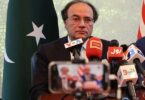The much awaited Afghan peace agreement was signed in Doha which kindled a ray of hope to end the decades’ long war in Afghanistan, impacting peace and stability of the region. The spillover effect of the continued war in Afghanistan on Pakistan was devastating that claimed more than 700000 lives of civilians and security forces of civilians and security forces in combating terrorism and incidents of terror in addition to 120 billion losses to the economy. The country has been bearing the burden of 3 million Afghan registered refugees and over a million unregistered Afghan Nationals.
Salient features of the agreement are: If the Taliban abide by the terms of the agreement then US and NATO troops shall be withdrawn within 14 months. About 8600 of them will leave Afghanistan by July this year. Intra-Afghan dialogue shall be held among all political groups, including the sitting government in Kabul to reach an agreement for the formation of a consensus government. President Ashraf Ghani has welcomed the US-Talban peace agreement and appreciated the facilitating role of the present government of Pakistan in clinching this historic deal.
The noteworthy feature of the Afghan peace agreement is the commitment on the part of the Taliban that the soil of Afghanistan shall not be allowed to be used by terrorist organisations such as ISIS and Al-Qaida and the outfits that operate under the umbrella of these international terrorist organisations. It merits mention that splinter groups of former TTP such a Jamiatul Ahrar and other factions are operating under ISIS and carry out terrorist attacks inside Pakistan. Russia, China and Iran are genuinely worried about the existence of ISIS strong holds inside Afghanistan. In one of the peace conferences hosted by Moscow, Russian Foreign Minister Sergey Lavrov had tacitly blamed the entry of this international terrorist organisation into Afghanistan on the United States without naming it. Russia and China have also made sustained efforts in promoting Afghan peace process by buttressing the ones made by the United States. These powers bear the responsibility to play their supportive role in future wiping out ISIS and other terrorist groups. Talking to media in Doha, Foreign Minister Shah Mehmood Quershi welcomed the signing of landmark peace agreement between the United States and Taliban and emphasised that Pakistan has fulfilled its part of responsibility in terms of facilitating this agreement. He assured that Pakistan will continue its policy of supporting Afghan people to achieve lasting peace, stability and development in Afghanistan. European Union and other countries of the world have welcomed the Afghan Peace Agreement and described it as first step towards achieving peace and stability in Afghanistan.
Top leadership of Pukhtun Nationalist political parties including ANP Central President Asfandiyar Wali and Chairman Qaumi Wattan Party Aftab Sherpao have hailed the agreement and expressed the hope that it will turnout as harbinger for the return of peace and stability in Afghanistan.
The post-Soviet troops withdrawal era of fratricidal war in Afghanistan and making it a sanctuary for terrorist groups serves a lesson for all stakeholders. After the signing of peace agreement, Taliban leadership must not feel intoxicated and participate in the intra-Afghan talks to reach a broad based political settlement leading to the formation of consensus government in Kabul. Foreign Minister Shah Mehmood Qureshi has revealed that Norway has made an offer to play host for intra-Afghan dialogue. However, he made it clear that it is entirely for the Afghan leaders to decide about it. Rationality must prevail in this regard.
In Pakistan the largest number of Afghan refugees has been staying and peaceful and stable Afghanistan will create conducive environment for their repatriation. It has looked after them for the past 40 years by providing relief assistance largely from its own resources as donor countries had long shown fatigue by substantially curtailing their assistance to UNHCR. Pakistan hosted international Conference on Afghan Refugees last month to sensitize the international community about extending help in their relief and succor and eventual repatriation to Afghanistan. In his address at the Conference, Prime Minister Imran Khan urged the international community to give a roadmap for the repatriation of Afghan refugees. The voluntary return of refugees had been agreed in tripartite agreement between Pakistan, Afghanistan and UNHCR in March 2003 in Brussels. Hopefully, Pakistan’s demand for roadmap of refugees repatriation shall be met when situation in Afghanistan stabalise.






